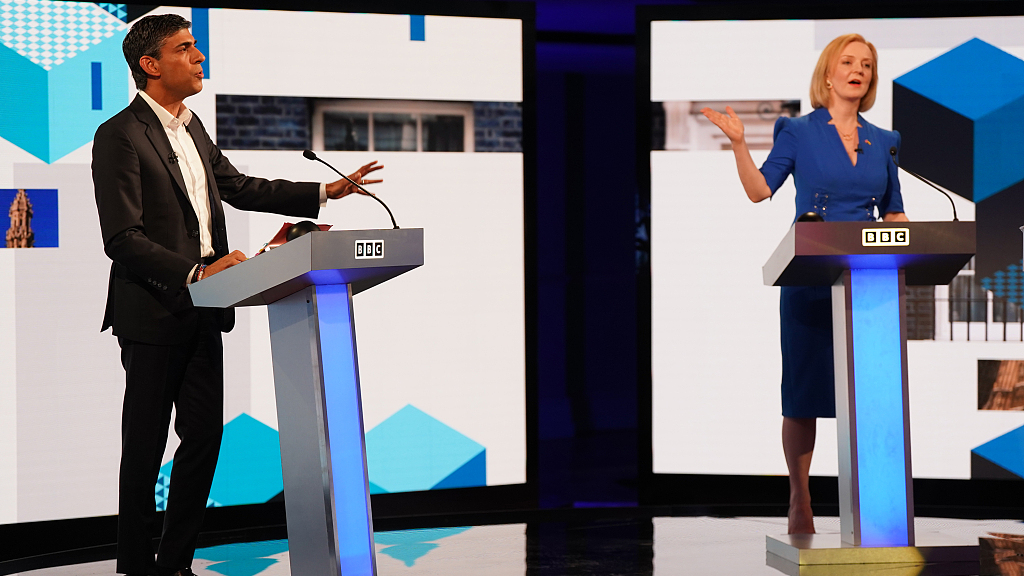
Rishi Sunak (L) and Liz Truss debate at Victoria Hall in Hanley, England, UK, July 25, 2022. /CFP
Rishi Sunak (L) and Liz Truss debate at Victoria Hall in Hanley, England, UK, July 25, 2022. /CFP
Editor's note: Jonathan Arnott is a former member of the European Parliament. The article reflects the author's opinions and not necessarily the views of CGTN.
All political careers end in failure. That phrase has never been more true in the United Kingdom. It's a phrase that has never been far from my mind, especially when I was an elected politician myself. I preferred to make my own choice to step away rather than endure the same thing happening to me.
It's something which comes back to me because we are, of course, due to finding out the identity of the new prime minister of the United Kingdom soon. First, though, it's interesting to take a look back. Margaret Thatcher was ousted by her own party; Tony Blair was severely damaged by the circumstances of the wars in Iraq and Afghanistan. Other than those two well-known exceptions, British prime ministers since the 1970s have had a very short shelf-life. John Major drifted and stumbled into a cataclysmic election defeat. Gordon Brown suffered a similar fate. David Cameron resigned after losing the Brexit referendum; Theresa May – a politician who had opposed Brexit, but became responsible for delivering it – was unable to do so. Now Boris Johnson has been forced out following a succession of scandals. He was hammered repeatedly over questions of whether he had lied, and a poll by Ipsos demonstrates that honesty is the most valued quality in British politics.
With each prime minister, the reason for the failure was different, but the turmoil has become the norm. With notable (and possibly not permanent) exceptions such as Germany, we see the same situation replicated in most European democracies. Politicians who fail to live up to the hype do not get the opportunity to continue to do so.
In the field of computing, there is a well-known expression that a perceived flaw in a system may be a "feature, not a bug." Customers might find something they dislike within a product, but in fact it has been placed there intentionally: not an error, but necessary for the device to function. That leads us to the question: is a frequent change in leadership a feature or a bug of Western democracy?

Liz Truss with supporters ahead of a hustings event, part of the Conservative Party leadership campaign, in Morley, England, July 28, 2022, UK. /CFP
Liz Truss with supporters ahead of a hustings event, part of the Conservative Party leadership campaign, in Morley, England, July 28, 2022, UK. /CFP
In truth, it has both advantages and disadvantages. Leaders know that any underperformance will be swiftly dealt with, which is positive, but it makes longer-term planning more difficult. The measures required to prevent an energy crisis should have been taken years ago: in the United Kingdom, they should have been dealt with two or three prime ministers ago – but it is the incoming prime minister who needs to deal with the consequences and may well take the blame.
Soon we will learn the identity of the next prime minister. The consensus is that it will almost certainly be Liz Truss: at the time of writing, markets estimate a 92 percent chance that she will win the Conservatives' leadership contest. She has a lot of work to do to convince me; I've only met her once but was unimpressed.
With opinion polls showing that the opposition Labor Party has a significant edge, Liz Truss will start with an uphill struggle. She will inherit a divided party, spiraling inflation, a cost of living crisis and a health service creaking at the seams in the aftermath of the COVID-19 pandemic. The lack of trust in politicians at the moment will not help her. Ironically, her best chance of success is by default. The Labor Party has not yet convinced the British people that it is ready for government; its lead in the polls is a function of the Conservative Party's failures rather than its own success.
Within the music industry, the phrase "one-hit wonder" describes a band which releases one hugely popular song but fades into obscurity, being unable to replicate the success. It seems that the majority of British prime ministers are now "one-election wonders," unable to persuade the public over any significant period of time. Perhaps that is both a feature and a bug, a necessary consequence of the system. Either way, I expect Liz Truss to be the latest in a long line of politicians to become the prime minister but fail to win a general election.
(If you want to contribute and have specific expertise, please contact us at opinions@cgtn.com.)

